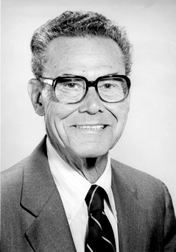

|

|
IN MEMORIAM
Richard W. Jennings
Professor of Law, Emeritus
Berkeley
1907–1999
Richard W. Jennings, who helped to popularize the study of securities law in United States law schools and to export concepts of market regulation to the postwar societies of Japan and Germany, died at his home in Piedmont, California, on August 9, 1999 after a brief illness. He was 91.
Richard Wormington Jennings was born on October 17, 1907, the son of a banker in Bois D'Arc, Missouri. He graduated from Park College, Parkville, Missouri in 1927, and briefly taught high school algebra before beginning graduate studies in political science at the University of Pennsylvania. By 1937, his imagination had been caught by the marked changes in business law that were ushered in with the New Deal, and he enrolled at Boalt Hall at the University of California, Berkeley, in 1937, receiving the LL.B. in 1939. After a period of private practice and government service during World War II, he joined the law school faculty in 1947 and taught there until his retirement in 1975.
Beyond the students who studied directly with Professor Jennings over the years, countless others encountered his passion for securities law by using the pioneering casebook that he wrote with Harold Marsh Jr. of UC Los Angeles. Formally titled Securities Regulation: Cases and Materials but known to students simply as “Jennings and Marsh,” it was first published in 1963. The two authors were described by friends and colleagues as “The Odd Couple.” In contrast to Mr. Marsh's tough, blunt-spoken demeanor, Professor Jennings was sweetness and light. As each wrote half of the casebook, the personality of the early editions was utterly schizophrenic.
Only with the eighth edition in 1998, when Richard Jennings was 90, did a new team take over this classic volume. As Professors John Coffee, of Columbia University and Joel Seligman, then at Washington University, St. Louis said, “the Jennings and Marsh team not only crafted a much respected casebook but also significantly shaped the field of securities regulation.” It was this casebook that allowed securities law to become a standard element of legal education.
During the 1960s, Richard Jennings wrote a series of law review articles that led to the abolition of the fixed-rate commissions system and to the reform of federal securities law, achieving an influence on securities regulation that extended well beyond the classroom. In consequence of this work, William L. Cary, the chairman of the Securities and Exchange Commission under President John F. Kennedy, recruited him as a consultant to the commission's first full-scale investigation of the securities markets in 25 years. Through his work on the study and his testimony at various Congressional hearings, he contributed to the public debate that led in 1975 to the elimination of fixed brokerage commissions on Wall Street. That change, though a difficult one for many securities firms, radically altered the securities industry through its introduction of competition to that sector.
Professor Jennings was invited in 1961 to serve as a Fulbright professor at Tokyo University and helped introduce modern securities regulation theory to the Japanese academic community. He was also a mentor, along with Professor Louis Loss of the Harvard Law School (the author of the first text in Securities Regulation) to an influential group of young law professors in Germany in the mid-1950s, who helped add securities regulation to the academic agenda there as Germany developed into an economic power.
Throughout his long and distinguished career, Jennings was a tireless advocate for investor protection and corporate responsibility, as well as for the role of the states in the supervision and protection of US capital markets.
On the Berkeley campus, beyond the law school, Richard Jennings was best known for his service as chairman of the faculty senate at the height of the Free Speech Movement in the mid-1960s. The period was marked by a cultural collision between campus liberals and the conservative establishment in Sacramento that developed against the backdrop of the Vietnam War. One of the undersigned, faculty parliamentarian at the time, can testify from personal experience that Jennings’s patient but authoritative leadership of a sharply divided faculty was a calming influence during those turbulent years. His personal integrity, ability to listen, and candor lent his words the ethical persuasiveness that was as essential in that charged setting as it was in the classroom.
In 1987, law school alumni expressed their affection for Professor Jennings by raising an endowment for a chair named in his honor.
Professor Jennings is survived by his wife of 64 years, Elizabeth Robison Jennings, of Piedmont; two daughters, Susan J. Stangeland and M. Anne Jennings, both of Berkeley; a son, W. Thomas Jennings of Sacramento; four grandchildren, and a great-grandson.
Richard M. Buxbaum
Melvin A. Eisenberg
Herma Hill Kay